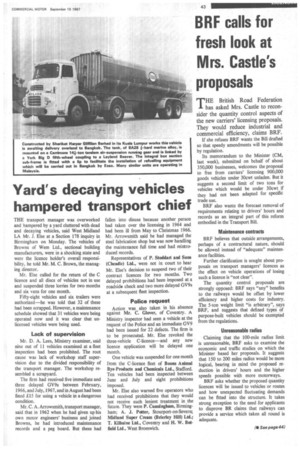BRF calls for fresh look at Mrs. Castle's proposals
Page 45

If you've noticed an error in this article please click here to report it so we can fix it.
HE British Road Federation has asked Mrs. Castle to reconsider the quantity control aspects of the new carriers' licensing proposals. They would reduce industrial and commercial efficiency, claims BRF.
If she refuses BRF wants the Bill drafted so that speedy amendments will be possible by regulation. Its memorandum to the Minister (CM, last week), submitted on behalf of about 350,000 businesses, welcomes the proposal to free from carriers' licensing 900,000 goods vehicles under 30cwt unladen. But it suggests a second limit of two tons for vehicles which would be under 30cwt if they had not been adapted for specific trade use.
BRF also wants the forecast removal of requirements relating to drivers' hours and records as an integral part of this reform embodied in the Transport Bill.
Maintenance contracts
BRF believes that outside arrangements, perhaps of a contractural nature, should be allowed instead of "adequate" maintenance facilities.
Further clarification is sought about proposals on transport managers' licences as the effect on vehicle operations of losing such a licence is "not clear".
The quantity control proposals are strongly opposed: BRF says "any" benefits to the railways would be offset by lower efficiency and higher costs for industry. The 5-ton weight limit "is arbitrary", says BRF, and suggests that defined types of purpose-built vehicles should be exempted from the regulations.
Unreasonable radius Claiming that the 100-mile radius limit is unreasonable, BRF asks to examine the economic and traffic studies on which the Minister based her proposals. It suggests that 150 to 200 miles radius would be more logical, bearing in mind the proposed reduction in drivers' hours and the higher speeds possible with more motorways.
BRF asks whether the proposed quantity licences will be issued to vehicles or routes and how unexpected fluctuating demands can be fitted into the structure. It takes strong exception to the need for applicants to disprove BR claims that railways can provide a service which taken all round is adequate.




































































































































